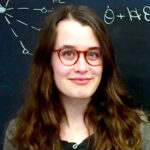How Dark Forces Shape Our Universe
At our January 30, 2021 Innovation Hour, hear from Hertz Fellow Katelin Schutz, a NASA Einstein Fellow and Pappalardo Fellow in the MIT Department of Physics.
How different would our Universe look with the addition of extra kinds of particles and interactions?
We have ample gravitational evidence that dark matter has properties unlike any particle we have previously discovered. It's possible that dark matter is made of many kinds of different particles that experience forces and interactions unlike the ones we are familiar with from the Standard Model. If these new forces only act on dark matter particles, it may be difficult to discover them and learn more about what is happening in this “dark sector.”
We know that dark matter and visible matter interact gravitationally. In her talk, Katelin will show that this fact alone is a good reason not to lose hope because dark forces affecting the spatial distribution of dark matter will have a gravitational impact on the visible matter that we can see. She will talk about a few examples of broad classes of dark sectors where we can look for their effects using existing or upcoming datasets.
This Hertz Foundation Innovation Hour will take place live on Saturday, January 30, 2021, from 9:00 to 10:00 a.m. Pacific, using the Zoom video conference platform. You can attend on a desktop, mobile device, or by phone. Please register using the form below, and we'll email you the Zoom meeting information.
Registration
About the Speaker

Katelin Schutz is a NASA Einstein Fellow and Pappalardo Fellow in the MIT Department of Physics. Katelin received her PhD from UC Berkeley in 2019 under the supervision of Hitoshi Murayama. Her dissertation work focused on observational searches for “dark sectors,” consisting of new particles and forces that would only interact very weakly with the visible world. These searches necessarily lie at the intersection of particle physics, astrophysics, and cosmology. Katelin’s doctoral work was recognized by the American Physical Society, which awarded her the Sakurai Dissertation Award in theoretical particle physics, citing her highly original contributions to this area of inquiry. Katelin will join McGill University in Montreal as assistant professor in August 2021, where she will form a research group jointly in the Centre for High Energy Physics and in the McGill Space Institute.